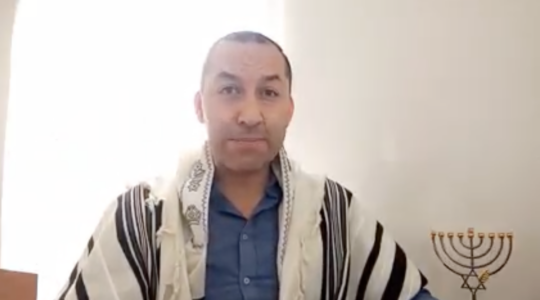BUDAPEAST (JTA) — The European Union said it will confer the prestigious European Heritage Label to the Hungarian capital’s Dohany Street Synagogue, which is the list’s only Jewish house of worship.
The European Commission, the bloc’s executive body, announced Tuesday in a statement that the 158-year-old synagogue, which is Europe’s largest and the world’s second-largest, would be added next year to the list of 38 heritage sites, which includes Slovenia’s Javorca Church, Italy’s Fort Cadine and Luxembourg’s village of Schengen, where the European Union leaders established a treaty enabling free, cross-border movement.
“The Dohány Street Synagogue Complex is a symbol of integration, remembrance and openness to dialogue,” the commission said in announcing the synagogue’s inclusion on the list, which celebrates places that it says “symbolize European ideals, values, history and integration.”
Also on the list are two former Nazi concentration camps: Westerbork in the Netherlands and the Natzweiler concentration camp complex in France and Germany.
The synagogue in Budapest is considered the birthplace of Central Europe’s Neolog denomination of Judaism, which is similar to the Conservative or Masorti movement. It has the interior architecture of a church in that the prayer platform, or bimah, is located at the end of the main hall and not in its center, as was customary in the 1850s, when the building was inaugurated.
Boasting a capacity of 3,000 people, the Dohany Street Synagogue also has three rows of pews evocative of a church. Women on major holidays are seated in the women’s section on the second floor but on Shabbat flank the men on the lower floor. The synagogue is used as a house of worship only in summer. Prayers during the winter are held at an adjacent smaller synagogue, which is easier and cheaper to heat.
Thousands of tourists visit the synagogue each month for guided tours in several languages. The site is operated by the Mazsihisz federation of Jewish communities.
Unusually for synagogues, which are kept separate from places of burial due to religious rules on purity, the Dohany Street Synagogue has a mass grave containing the remains of at least 2,281 people in its interior yard. The dead, whose identities are for the most part unknown, were placed there in the winter of 1944 when the synagogue was part of the Jewish ghetto.
The synagogue complex also contains a symbolic headstone for Raoul Wallenberg, the Swedish diplomat who disappeared who issued life-saving diplomatic passports to thousands of Hungarian Jews who were able to use them to escape the country when it was controlled by the Nazis and their local collaborators.
JTA has documented Jewish history in real-time for over a century. Keep our journalism strong by joining us in supporting independent, award-winning reporting.





